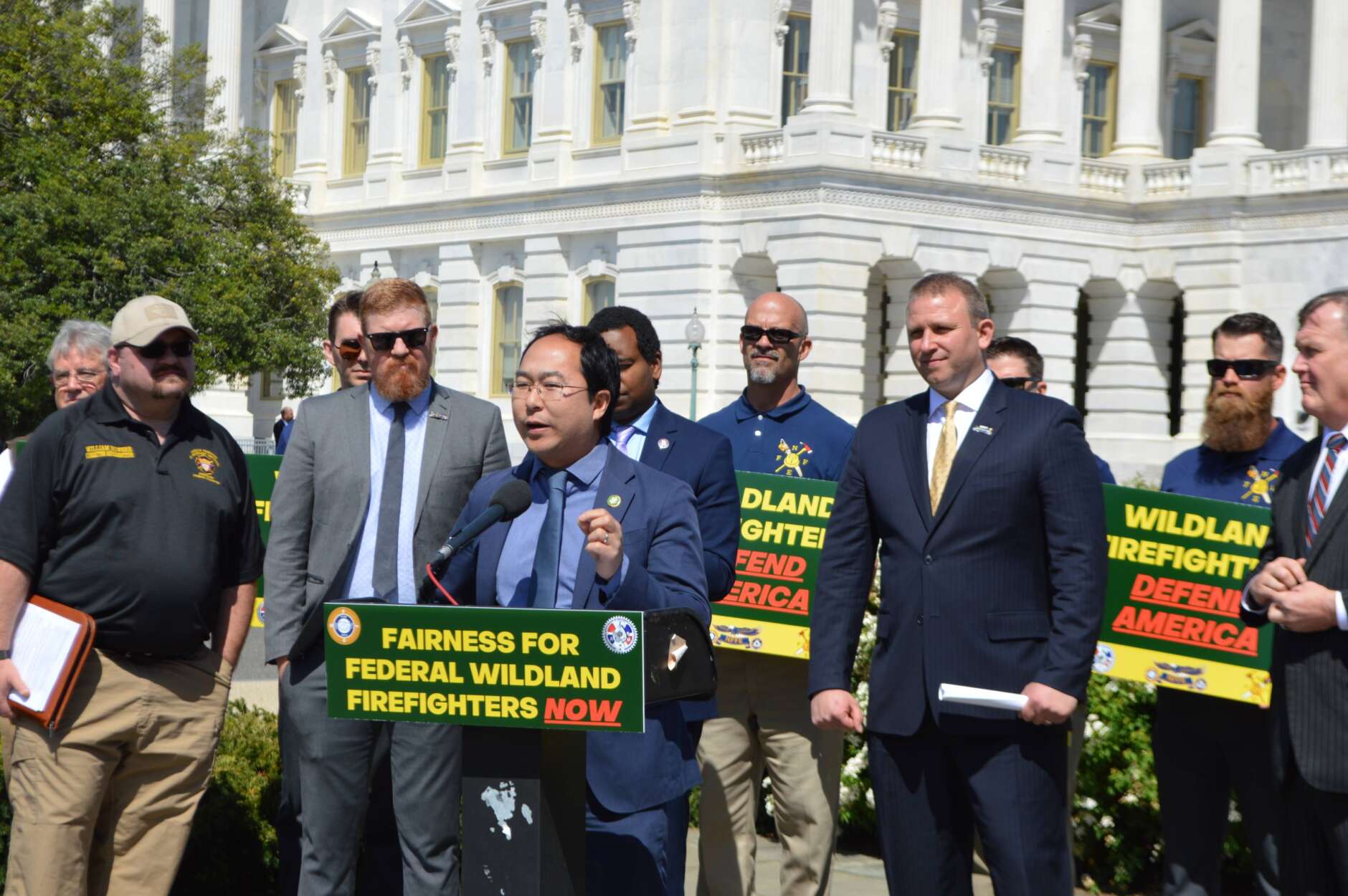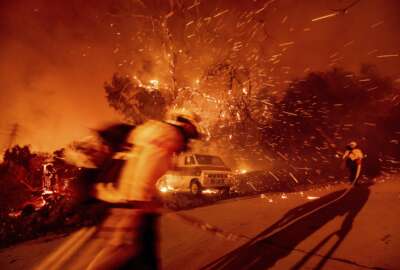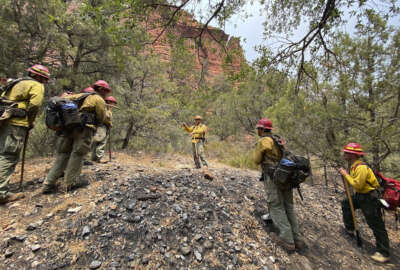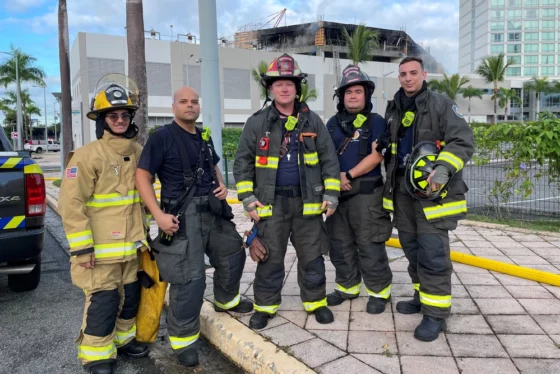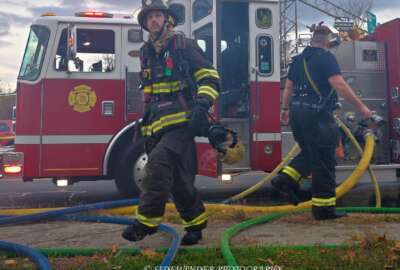
With time running out on a temporary pay raise, federal firefighters press Congress for a permanent one
A two-year pay raise for federal wildland firefighters will expire on Sept. 30. The first responders joined union leaders and lawmakers to push Congress for a...
Beyond an already dangerous day job, federal wildland firefighters are facing internal workforce challenges that make responding to longer, more severe wildfire seasons all the more difficult.
An upcoming expiration date for a temporary pay raise drove the federal first responders, along with union leaders and lawmakers, to gather outside the Capitol building Wednesday. They’re calling on Congress for a permanent pay raise and other crucial benefits to stopgap a dwindling wildland firefighting workforce.
“Our federal wildland firefighters put their lives on the line to keep our community safe. But the lack of support that they’re given has left agencies scrambling to recruit and retain workers, and it has left workers without the benefits and support that they need,” Rep. Katie Porter (D-Calif.) said at the press conference at the Capitol. “These are long-running issues with pay and benefits for wildland firefighters. On top of that, firefighters must grapple with worsening climate disasters and high housing costs. It should not be a huge surprise that this labor force is understaffed when workers can make more as new employees at Costco than they can parachuting into forest fires.”
Federal wildland firefighters, mostly employed by the Departments of Agriculture and Interior, as well as the U.S. Forest Service, received a temporary pay raise as part of the Infrastructure Investment and Jobs Act.
Under the infrastructure law, federal firefighters received either $20,000 or 50% of their annual base salary, whichever number is lower.
For the first responders, the pay bump “was huge,” said D.J. Coughlin, a federal wildland firefighter in a prevention technician role.
“It made it go from surviving to living. Not necessarily thriving, but able to live,” Coughlin told Federal News Network at the event.
Coughlin, a union member of the National Federation of Federal Employees (NFFE), said high housing costs in many of the areas where wildland fires occur make the problem of pay even more acute.
“There’s not a lot of available housing. What was available was costly, even for the area. I ended up sleeping in a tent or sleeping in my car for a whole [fire] season — eight months. I just couldn’t find a place to live … Because of all this, we’ve become pretty good at managing finances, but it’s managing pennies and not dollars.”
But federal firefighters are running out of time for the temporary pay boost. The provision expires Sept. 30.
“All of a sudden, we’ll just lose it,” Justin Brown, a federal wildland firefighter, said in an interview with Federal News Network. “Everybody that I have talked to has said they already are looking at other jobs. They’ve got their finger on the button.”
The fast-approaching deadline makes it all the more urgent to federal wildland firefighters for Congress to act sooner rather than later.
“Even if there’s a slight lapse in the funding to keep giving us what we’re already getting, people are going walk,” Brown, also a member of NFFE, said. “Then we’re going to have no specialists in wildland firefighting … Without us, it’s going to fall apart.”
NFFE, the federal union representing the group of first responders, has remained a long-time advocate of increasing pay and expanding benefits for federal firefighters.
“There can be a lot of hyperbole in Washington. This is not one of those cases,” NFFE National President Randy Erwin told Federal News Network at the event. “We have a crisis in this country. It needs to be addressed this year, or we are going to hit that [expiration] date, and then we’re not going to be able to put out fires in this country for a period of time until that change is made … We’re going to have an exodus out of the federal service.”
Despite some legislative progress over the past few years, Erwin said a permanent pay raise is necessary, and will help address other long-standing workforce issues of recruitment and retention.
During peak wildfire season, firefighters often have to spend weeks — sometimes months —away from their families, and working upwards of 18 hours per day. But with low pay and limited support, employees said continuing in this manner has become increasingly difficult.
“Until it’s permanent, they do not have the security that they need to be able to stay in these federal wildland firefighter positions,” Erwin said. “[Low pay] is causing a problem with not having enough boots on the ground. We’ve got fire trucks going out there at half capacity.”
The fiscal 2024 White House budget request includes funding to permanently increase pay for federal firefighters. The proposal also includes more support for mental and physical health, a boost in the number of available positions and expanded housing options.
Another issue for the federal firefighting workforce is differences among job classifications, which can vary depending on the employing agency. Variations in job descriptions can, in some cases, mean differences in pay and benefits, despite doing the same or similar work.
NFFE has also said that it’s difficult for federal firefighters to move up in the ranks, often not reaching the rank of captain as a GS-8 employee until serving for eight to 10 years. Nearly half of firefighters’ salaries come from overtime or hazard pay.
To fix the problem, NFFE recommended a new classification system, which was included in the White House budget request.
The budget proposal, if enacted, would create a new salary table for wildland firefighters. Employees on the Federal Wage System would receive an increase to their base pay. Additionally, the budget proposal would create a new pay category — incident standby premium pay — that would offer 50% of an employee’s standard hourly rate for nine hours of every 24-hour duty period. Finally, the proposal would increase the pay cap for federal firefighters. The heads of Agriculture and Interior would be able to waive the pay cap during particularly bad fire years.
There have been some recent legislative improvements for federal firefighters over the past few years, many of which gained large bipartisan support. For one, the First Responder Fair RETIRE Act, enacted in December, lets firefighters and other federal first responders qualify for full retirement benefits if they are injured on the job and return to the federal workforce.
Other legislation in Congress is looking to benefit federal firefighters further. The Federal Firefighter Pay Equity Act, reintroduced by Rep. Gerry Connolly (D-Va.) earlier this year, would count the full compensation of mandatory overtime hours toward the front line employees’ retirement savings.
Anticipation is high among federal firefighters as they look to Congress to make the pay raise permanent.
“It’s always on the mind. I’m always searching the headlines waiting for it to go through, to go to the next level, for it to pass,” Coughlin said.
“The job is awesome, and nobody wants to leave. Everyone is super hopeful that this all passes and then we get to keep doing what we actually love,” Brown said. “But if it doesn’t, everybody’s in agreement, everyone’s going to start walking.”
Copyright © 2025 Federal News Network. All rights reserved. This website is not intended for users located within the European Economic Area.
Drew Friedman is a workforce, pay and benefits reporter for Federal News Network.
Follow @dfriedmanWFED


